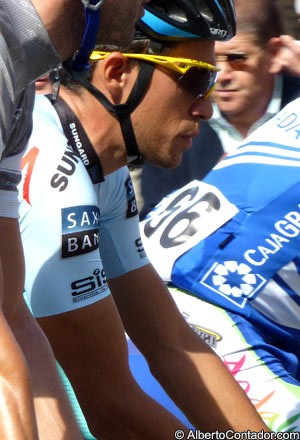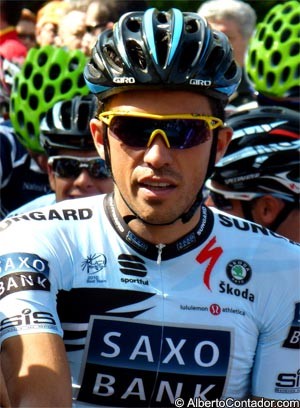Spaniard has been building steadily rather than sitting on the beach
 Three years ago, Alberto Contador was relaxing on a beach when he got a call from his then-Astana team to say he’d be riding the Giro d’Italia. Handed a last-minute wildcard by the organisers, he and the team went there with limited preparation. Against the odds and against expectations, they managed to win.
Three years ago, Alberto Contador was relaxing on a beach when he got a call from his then-Astana team to say he’d be riding the Giro d’Italia. Handed a last-minute wildcard by the organisers, he and the team went there with limited preparation. Against the odds and against expectations, they managed to win.
This time round, he’s going there with more preparation and a full awareness of the course. He’s chasing what would be the sixth Grand Tour victory of his career and, even if he admits it’s the toughest route he’s yet faced, he’s in a better position than three years ago.
“In 2008, I was clueless about the Giro. I didn’t know how it started or what the route was like or which riders were going,” he said. “I knew absolutely nothing. This year, on the other hand, I know the riders that are going, I know the route, and I’ve been able to do preparations tailor-made for the Giro.
“About the route, I think it’s much harder this year than the one I rode in 2008, although it’s true what some riders say, that the 2008 route was really hard, too. But I still think the difficulty of this one is greater.”
Contador has been planning the race for a long time, but preparations still haven’t been ideal. The reason for that is his positive test for Clenbuterol at last year’s Tour de France. He’s been dealing with the pressure that invariably brings, and knows that he has a battle ahead of him against the UCI and WADA in the Court of Arbitration for Sport.
Still, he’s managed to get some good racing in. After being cleared by his national federation the RFEC, he began racing at the Volta ao Algarve in mid January and finished fourth overall. After that he went to the Vuelta a Murcia, which he won, and also triumphed in the Volta a Catalunya.
Contador’s fortunes have been more mixed since then; he punctured at a crucial moment in the mountain stage of the Vuelta a Castilla y Leon, losing any chance of a high overall placing, rebounded to win the time trial, then finished a distant eleventh in Flèche Wallonne.
All in all, he said that he’s happy with his condition. “I am eager to get started,” he said. “In these last two months I’ve tried to do the best possible preparation without being obsessive, but I think that I’m really well prepared.
“I’ve had a cold recently, and I’ve also had a little difficulty breathing, so I had to take it a bit easy at times. But on Saturday, when the race gets started, I’ll be in good shape.”
Since Flèche Wallonne, he spent some time in Italy to check out what he describes as ‘four unbelievably hard Giro stages,’ did some sponsor work, then had a three day training camp in the mountains near Madrid to further hone his form.
Rivals and route:
 Contador may be ready, but so too will some of his rivals. He has a clear idea of those who could pose him the greatest difficulties, saying that there are many who he will have to be careful of. “I don’t like to name names because you always fail to mention somebody, but I think that the ones who are most motivated and under the most pressure are Nibali, Scarponi and Menchov,” he said.
Contador may be ready, but so too will some of his rivals. He has a clear idea of those who could pose him the greatest difficulties, saying that there are many who he will have to be careful of. “I don’t like to name names because you always fail to mention somebody, but I think that the ones who are most motivated and under the most pressure are Nibali, Scarponi and Menchov,” he said.
“Then there’s a great group with Kreuziger, Igor Antón, Joaquím, Sastre, Sella and many others who’ll also have opportunities.”
The race begins on Saturday with a team time trial and he knows it could be an early opportunity to open time over his competitors. Saxo Bank SunGard has traditionally done well in these group disciplines, and with strong time trialists like Richie Porte on the team, he will hope to build an early advantage.
“I’m really happy [with the team], because the riders are motivated. Even though there are stronger teams than ours for the mountains, like Liquigas, Lampre, Geox or Katusha, I’m happy, and I’ve got complete confidence in all of them. I think they’re going to respond perfectly.”
However Contador cautions that the nature of the team time trail means that the advantages which could be gained as not as significant as in longer tests. He’s strong against the clock and knows he will stand to gain more from the two solo time trials; there he’ll aim to gain time over the climbing specialists, even if he can also go head to head with them in the high mountains.
“The mountain TT and the Milan ITT are both demanding,” he explained, thinking ahead. “The mountain TT has some very tough stretches, and the last ITT is tough because everybody’s legs will be shattered towards the end of the race. That might tip the balance in the case of two riders being really close in the GC.”
As a proven winner in time trials, Contador will take encouragement from that. He’d prefer to be further ahead at that point, though, rather than having to rely on the final race against the clock to secure a win. He’ll push hard before then, knowing that riders such as Nibali and Scarponi will face more pressure than him.
The first reason is the fact that they are Italian, and therefore will have the burden of home expectation on their shoulders. The second is that he is usually stronger than both in the time trials, and so that puts a clear onus on them to open up time on him in the high mountains.
He said that he’s going into the race knowing that he’s dealt with bigger pressure in the past, and come out on top. That gives him encouragement in this situation.
“I take on the Giro in a totally different way than the Tour,” he said. “In the Tour, I’m under much greater pressure than in the Giro. About the difficulty of a race, you never really know. Sometimes the Tour turns out to be easier than you would think before the race. And then on the other hand, you go to the Giro, and it turns out to be way more difficult to win than expected.
“The difference between the Tour and the other Grand Tours is that the mountains are being climbed at an extremely high speed and the flat days absolutely wear you out. In the Giro, they’re a little more bearable.”
In three and a half weeks’ time, he’ll know if that all translates into a sixth Grand Tour win. Even so, the final outcome won’t be known until the end of June, when CAS rules on his case.